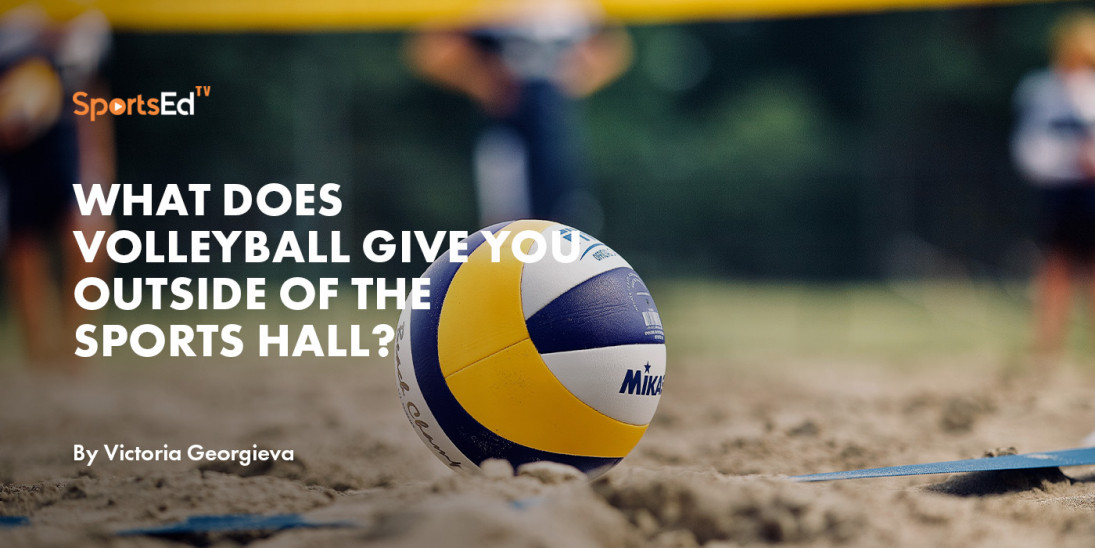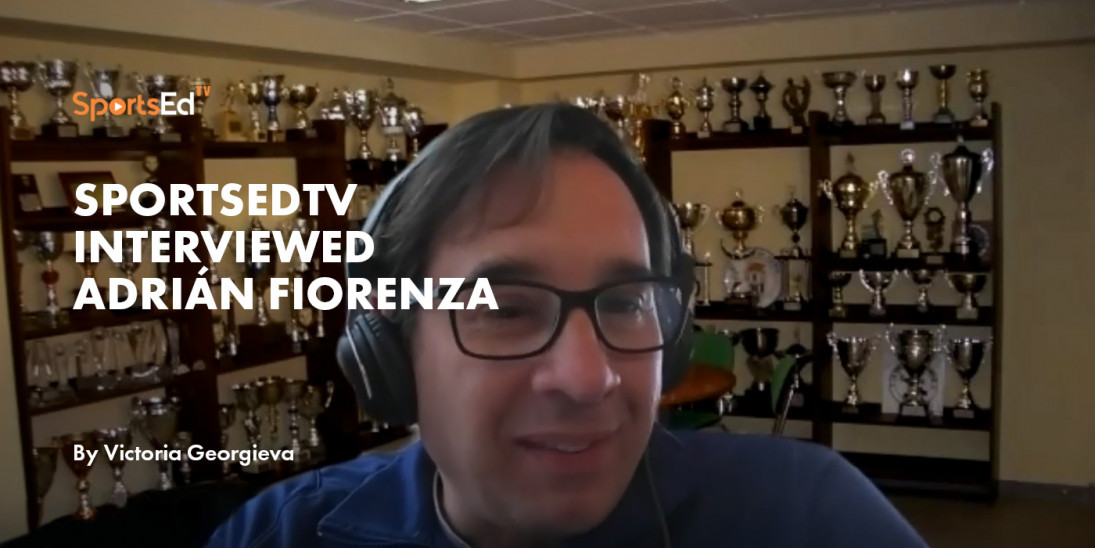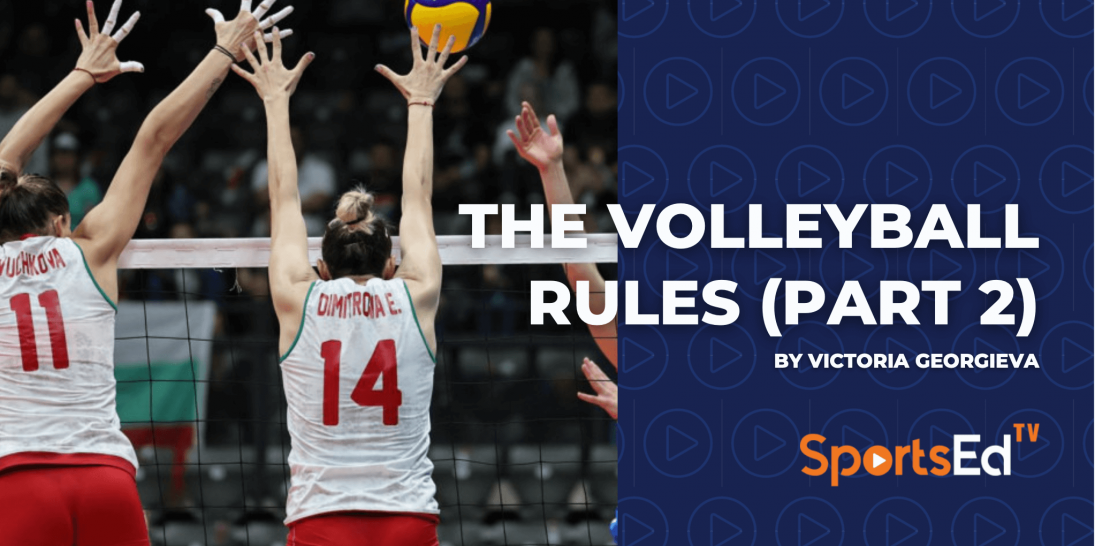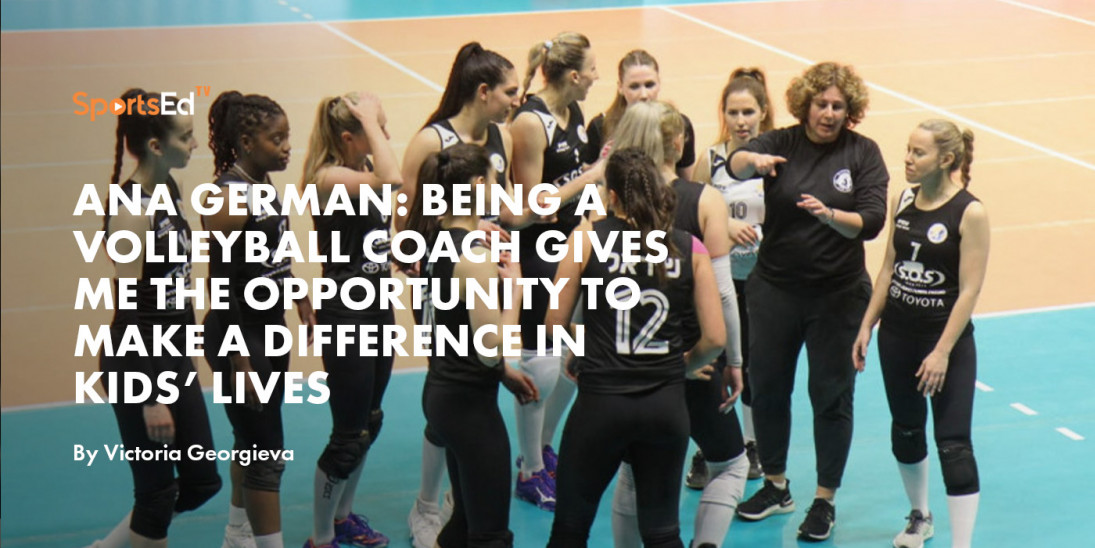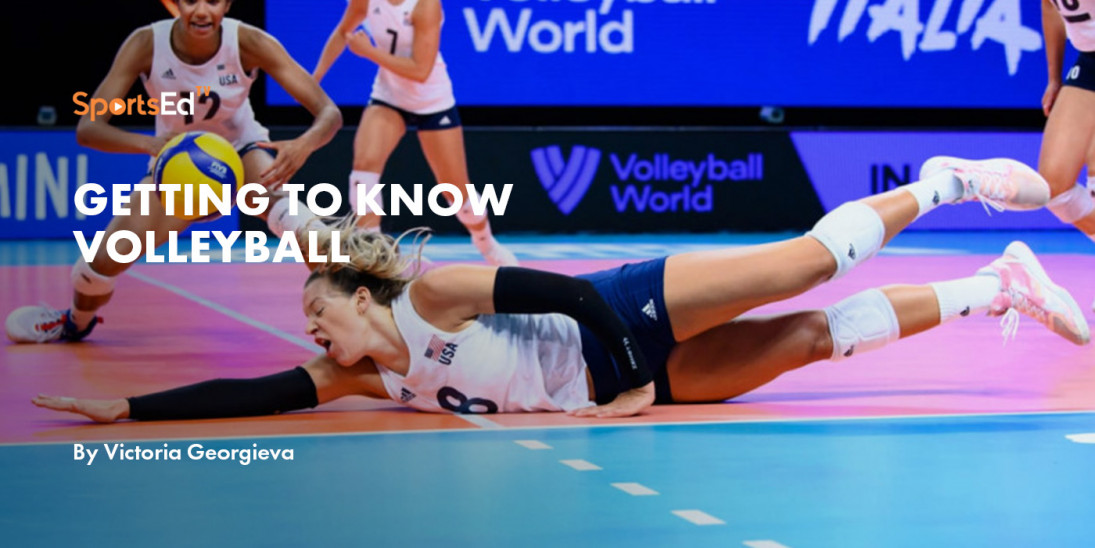Volleyball
Welcome and thanks for visiting...

Donald Suxho: To Achieve the American Volleyball Dream, You Need to Take Things ‘One Point at a Time’
Once upon a time…
This is how fairy tales usually start. As kids, we read them and we get inspired. However, as we grow old, most of us stop believing. We see that not every real story has a happy conclusion.
Luckily, the stories that can bring our faith back still exist. Volleyball gives us many of them, and we at SportsEdTV want to share one of the most successful ones with you.
Once upon a time… There was a boy who grew up in a small town in Albania - that mysterious Balkan country, who many got to know only after the communist regime fell down back in 1991. A boy whose father was a volleyball coach himself, dedicating his life to Albanian volleyball and coaching the Albanian national team for 20+ years.
A boy who, with the change of the regime in his home country, had his life completely changed. He had to fight to get through each day and his salvation was Volleyball.
A boy that immigrated to another continent and started his new life from scratch…and again, Volleyball was there for him.
That boy, this man, is someone to whom you would say, “Hey, you have achieved the American dream!”. The American Volleyball Dream.
This boy turned out to be one of the most successful U.S. players and has his name written with golden letters in the story of U.S. volleyball.
Donald Suxho, former setter of the U.S. national team, is the living proof that fairytales do exist. And that you need to work for them.
Proud husband and dad, two time Olympian, Donald has played in some of the strongest Volleyball leagues in the world such as Italy, Poland, and Russia.

Even though he retired in 2014 at the age of 38, Donald and Volleyball are still connected. His wife, Eleni Suxho, also a former volleyball player, has opened a Volleyball club in South California where the family lives. Donald is involved in the club, and both their children are training in the sport with the older one, Shane (19), being already in the college and having special training sessions with his famous father.
“I grew up playing volleyball, so the game is in our blood, in our family. I am really happy to live here in South California, we play a lot of beach volleyball on the weekend. That’s always fun. Not the same level as before, but it is always good to play. I help a few volleyball friends, from clubs, national teams, just consulting. So I am on and off, but still involved with volleyball.”
Back to the roots
Volleyball has been the key factor for Donald in many difficult life situations. Born in Albania in 1976, Donald and his family immigrated to the USA in 1995 when they first arrived in Boston. There, Donald had to take up several jobs such as washing dishes and selling donuts. He remembers that the first year was very difficult for him, and along the way he would have to face many more obstacles. Eventually, he achieved what we can call “The American Volleyball Dream”.
“Looking back to Albania, I grew up in communism. We didn’t know anything better. Everything that we had was one TV channel and one radio channel. We didn’t know anything about the outside world. But we had sports. My father got me training in Volleyball at a young age and this is how I fell in love with the sport.”
Isolated from the rest of the world, the communist regime in Albania fell in 1991. However, what followed next for the Albanians was a ways away from what one might call “a good life”. In the uncertain years of the 90s, the Albanian society had to face various wars and hunger, with sport becoming one of the last things on the list of the priorities of authorities. In these difficult moments Donald and his family continued to grow closer to the sport, Volleyball being one of the few things that kept their spirits alive.
On Immigration and beyond – how Volleyball saves lives?
With the chaos growing in Albania, Donald and his family started looking for new opportunities for a better life.
“My grandmother was born in the USA. She herself had immigrated to Albania, so when the borders opened she went to the U.S. Embassy and told them she wanted to go home. They told us we needed to wait for five years. I believe this was the hardest part. All of a sudden, you start dreaming a little, and when the time came it was really scary to pack the bags and to move to a whole new continent.”
Moving to a new country and leaving your life behind is indeed a scary thing to do. In the years without smartphones and so much technology, you would know when leaving your country that it was likely you wouldn’t return for years.
“The first year of immigration was rough. Again, we kept sports in our lives. Me, my dad, my cousins, we would go outside to play, to do some running. Volleyball kept our passion to go to work and to forget at times about that heavy immigrant cloud over our heads.”
Volleyball became a strong tool for Donald to integrate better in the American society and helped him in the difficult transition period, serving as a unique language and “cultural bridge”.
“Volleyball gave me my passion back. Most of what we were doing was working and trying to fit in. Volleyball was the only thing where I would let go of my emotions. I was in a better world, yes, but it still wasn’t an easy thing to adapt. For me, the court was a great place to go meet friends and in a way advance in my ability to understand the American mentality. Once I got into the game, a few kids and coaches helped me out to understand how American Volleyball works because at that time, I had no idea.”
The beginning of the Volleyball Fairytale
One thing led to another, and Donald joined the USC Trojans.
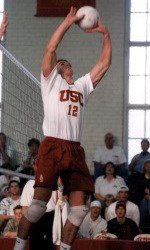
“I remember, in Boston there was a huge snow when I left. I flew to LA, sunny weather, 35 degrees. I walked in the gym, an amazing place, and I remembered the gyms from my childhood. No heating, no hot water, terrible. I realized the chance that I had and made a pact with myself: There was no way anybody would beat me. If I lost my job, it had to be because I was injured. But there was now way I was going back to washing dishes. I focused every day on becoming the best that I could be.”
This is how the Volleyball fairytale of Suxho started back then. When he talks about it, remembering these first and challenging steps, he is trying to send a message to all the young athletes.
“Many kids quit too early because something is not going their way. But you don’t know your future. My future was broken in 91’ when communism fell down. No leagues, no money. I could have quit back then, but I stayed with sports.”
However, when immigrating to the USA professional volleyball wasn’t the priority of his agenda. His goal was to be able to work and save some money, and he thought he was done with volleyball. At the same time, his internal fire kept him “scratching on the surface”, trying again and again.
“Being an immigrant gave me an extra power. In general, when the human being is going through difficult and uncomfortable situations, they help you grow. For most of us immigrants who had to leave our countries and figure it out from zero, this thing made us tougher.”
Immigration does make you tougher, but it also opens up a lot of your horizon. It helps you to see different and new approaches and scenarios and to learn from them. Such was the case of Donald getting to know American volleyball better.
“The first thing I learnt about American volleyball is that the people are so positive. They work hard, but are not pointing fingers as we do in Europe. The focus is not on the mistake.”
Coming from the Balkans where many are famous for having a quick-tempered nature, it wasn’t an easy thing for Donald to switch to this new approach to the game. When you lose a set, you continue by focusing on the next one and by segmenting the road to success, believing in the “one point at a time” motto.
It would take him a while to fully get immersed in this new belief.
“I would say that this process finished when I joined the USA national team, and I owe this to our coach Doug Beal. He was one of my mentors. When I got in, I was like a young kid with so much energy, both physically and verbally. Doug sat me down and said that he loved my emotion, my spirit, my fire, but that we needed to channel this energy in a different way. He said that if I get angry with the team or with the referee, how about I jump higher, block harder, dive faster? How about I score an ace? This is when I realized I had been doing it wrong. So, I figured it out- anytime when I get angry, when my Balkan hot headed part comes out, I will use my energy in another way. I am going to block Giba, I am going to score 8 aces. It’s funny how when you start to channel an emotion like this, it becomes a habit”
Donald would see the ultimate results of this approach years after when part of the U.S. national team:
“In the States, we have this “never got too hot, never got too cold”. Just look at the next point and break the spirit of the other team. After a while, you see the other guys start making mistakes. The coach of the other team gets angry; their opposite hitting out. While we were remaining stable.”
This Volleyball lesson is something that Donald brings with him in his daily life.
“We all get hit by difficult things. We have our bad days. And we need to build up the ability to not act right away emotionally, but to first take a deep breath and then, the very next day to figure out why this happened. That’s what we used to do in the national team, too. If we lost a game, we wouldn’t get angry with each other. In the morning, we would go watch a video and we would analyse the results. I definitely owe sports many qualities that I use in my life.”
Another challenge on the way – how to join the U.S. national team?
One of these qualities is to never give up even when things seem impossible.

By the year 2000, Donald was a star in the USC Trojans and naturally calling the attention of different coaches. His aim back then was to go back to Europe and start playing in the strongest clubs. He wasn’t an American citizen yet and thus not able to try out for the team. But when talent and determination speak, even the most difficult situations can be resolved.
“My coach in USC approached me and asked me if I had thought about trying for the national team. The U.S. national team was the best, but I believed it was too big for me. However, my coach called Doug Beal and asked him if he knew me. He said he did, but I wasn’t American. I was supposed to receive my citizenship in 2002. That would have been too late for me to join the team for the next Olympics. I would have had to wait until 2005, which seemed like ages. We had to figure out how to become an American in 2000. We went to the university and asked for help, and we found a way to fast-forward my application in the waiting list considering my case as a special one. After Sydney 2000, I called Doug and said to him I got the passport so he invited me to go and try out for the team.”
In September 2000, Donald went to the U.S. Olympic Center in Colorado Springs together with some great American players from his generation, such as Clayton Stanley, Riley Salmon and others. They stayed there training together for the whole winter.
For the boy who grew up in Albania, in a city of 20,000 people, with no shoes to train with, this was a dream coming true.
“I looked up again and said, ‘Thank you, Lord’! I can’t even explain that feeling because it hasn’t even crossed my mind. To train there in this Center, seeing athletes like Michael Phelps… Amazing.”
Donald remembers that staying at the Olympic Center during the winter was a matter of choice. Doug gave the idea and the freedom to the athletes to decide.
“I am so thankful to have made that choice. Sometimes, you need to trust the people around you. I trusted Doug, who said ‘stay here, train with me, let’s shift your mindset, the crazy part of the Albanian, and make it positive. I know why you have it, how you grew up but let’s channel this into something positive’. All those negative emotions and experiences, I ended up shifting them into becoming better, understanding that I have to focus on my team.“

A new dream is born
Back in Albania as a kid Donald had never watched the Olympic Games, so being part of an Olympic team never crossed his mind. However once he joined the U.S. national team, a new dream to be part of something special was born.
“Making it to the Olympic team, this is very difficult. Each year hundreds of players try out. If you play in Europe during the club season, once you are back home in the USA, you have to change your mindset quickly. This is why in the summer of 2004, when I saw my name in the roster for the Olympic Games, I froze in tears. That summer, it was like somebody had shot me with adrenaline. I couldn’t sleep. I was on fire, flying high.”
Participating in the Athens 2004 Olympic Games, Donald was so close to his beloved home country Albania, yet so far away. He wasn’t allowed to enter since being an emigrant had him put on a “black list”. But Donald holds special memories in his heart from this event:
“You can't describe the feeling of being in the Opening Ceremony of the Olympics. I remember it though. I was in the tunnel; all the countries had went in, the USA were the last to enter. We walked in, the whole stadium exploded “USA! USA!” Back then, we didn’t have iphones, etc, but I was crying as a kid. I was numb. Kobe Bryant next to me, Lebron next to me. I looked around in tears and I asked myself ‘What is going on?’ Unbelievable”.
In these moments, there was nothing else for Donald to do but to be thankful. Thankful to Volleyball for having changed his life.
“Finally, it all made sense, it came full circle. I am forever thankful to my dad, to Volleyball, to the coach in Boston, to the sport, for everything they have given me during the years.”
To Greece and back – you never know who you will meet again
Playing with the U.S. national team in the Men’s Volleyball Tournament in Athens 2004 had also brought other memories to Donald’s mind.
Back in 1994, before going to the USA, Donald and some of his volleyball friends walked on foot to Greece with the aim of arriving at Thessaloniki and trying out for the local club Ajak. They climbed over the mountains around his home country, Korçë, taking a very dangerous trip crossing the border. Something that they weren’t allowed to do by that time due to the political situation.
“We couldn’t drive, we had no visas, we were not allowed to leave because of the wars. It took us 15 hours to get on the other side of the mountain, where a car picked us up. It was a crazy night, people were shooting at us in the darkness. It was close to stupid, but we had no choice. I had one chance to go out to Greece. So we went there, we tried out for the team, but the coach didn’t take me. It was kind of the Albanian-Greek relationships back then. So, they sent me home.”
They say the world is small and you almost always meet the people who have had some impact on your life (be it in a positive or negative way).
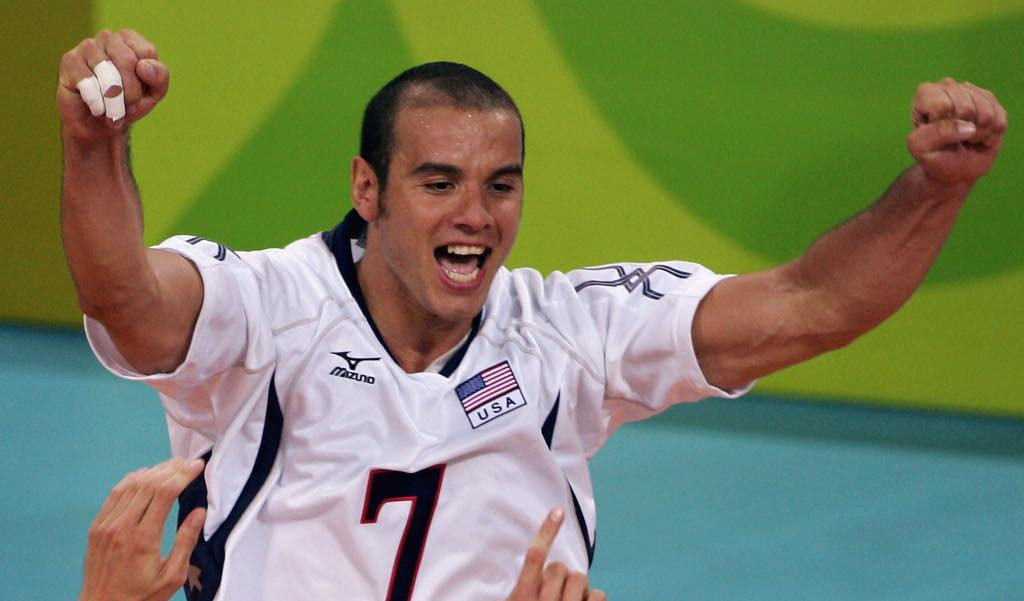
“Back in 2004, the craziest thing was in the quarterfinals when we played Greece. They had a very good team by that time, we were losing badly from them 1-2. Fourth set 12-20. I was a young setter back then in the team. Lloy Ball was the first setter, I was backing him up. And then the coach got me in and told me I had to do something. I looked around and there were 15,000 Greeks, screaming, celebrating, dancing. In a matter of a second, I saw one of the assistant coaches of the Greek team. The same guy who cut me 10 years ago in the Greek team. You gotta be kidding me, I thought!”
The rest is history, as they say. Donald shared the short story of the Greek Odyssey with his teammates during a time out and told them they needed to win. The most amazing thing happened when his already American mindset took control and Donald realized that the victory can come only with the mantra “one point at a time”.
“We kind of became like a stone. We forgot about the emotions and everything surrounding us. Let’s get one point, let’s get the second point. And let’s hustle like our lives are in danger”.
Team USA emerged victorious after taking the tiebreak at 17-15, and this win became the greatest comeback in the Olympics.
In the moments after the match, when Donald and his teammates were crying from happiness and hugging each other, someone approached Donald from behind and poked him. The assistant coach of Greece.
“At first, my Albanian part came to me and I reacted as a Balkan guy. But in the end I said ‘Thank you for cutting me. I owe my life to you’. Now that I think about it, him cutting me in 94’ was another engine inside of me. I was pissed off back then because I knew it was a matter of politics.”

Rainy days on the road
One of the most difficult moments for Donald was the injury he suffered in 2007/2008 while playing for the Italian Cup. He ruptured his Achilles while just setting the ball. This injury broke his dream of winning the Gold with the US team at Beijing 2008 (which eventually his teammates did).
“I felt down, I was in pain, the doctors came and said it’s an Achilles injury. That’s when I thought ‘No, Beijing is gone’. After losing the semi-final to Brazil in Athens, in the national team we had this common goal to go back and grab the gold. We had written our plan step by step, we had it printed down on the front page of our folders, and we were building it up. When I got injured, I was 31, in the top shape of my life, so to me it was the hardest thing. I had spent seven years working for a medal from the Olympics. But then this was another experience that I had to overcome.”
Donald applied the “one point at a time” approach once again, but now in a different way. He focused on his health first and created a 3-steps roadmap in his head, where first he would better his health and make his leg stronger, then he would get back on the court, and in the end he would fight for his spot in the team.
This is his advice to other players who face injuries.
“Don’t think of the future, don’t think of contracts, don’t think of anything else but to make a competition with yourselves. For me, it wasn’t easy in the first few months, but after that I took it as a competition “Me and Achilles”. Who’s gonna win? That’s it. That’s the focus I had. I did what I had to. If I had to do 1000 stretches a day, I would do them. If the coach advised me to go walk on the sand, I would spend the day there. My focus was on the present. Because when you start thinking about the future, that’s when you stop working for the present.“

Giving back – to Albania and to the world, with love
When talking to Donald, you can see his admiration and gratitude to the USA and the U.S. Volleyball. His love for them. At the same time, you can’t help but notice the sparkle in his eyes and the smile on his face when sharing about his home country.
“I remember my home club Skënderbeu Korçë, where I grew up, where my father played. Where it all began for me. Albania had and has a very good tradition in Volleyball. Albania has a very good youth system, now it’s getting better, there are some investments, outside and inside.”
Donald says he is following Albanian Volleyball closely.
“I have gone back a few times; I played a little bit there, trained young players for a week.”
The protagonist in our story, the Albanian who managed to reach the world’s Volleyball heights, doesn’t stop dreaming; now about giving back.
“One of my dreams is to be able to go back to Albania and to influence somehow. To build, to give back – financially, or mentally. Anything to grow the youth. Albania is my country. But in general, in volleyball, I help people from all over the world. Volleyball got me here and there were people who helped me to become who I am. The least I can do is to help and give back. I hope that in the future I can build better facilities. Give the youth the opportunity to train and have better conditions and hopefully one day… you never know who is training in these halls.“

